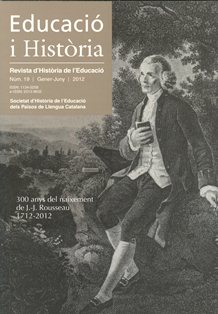Rousseau, le Copernic de la pédagogie? Un héritage revendiqué et controversé au sein même de l'Institut Rousseau (1912-2012)
Article Sidebar

Main Article Content
Rita Hofstetter
The doctor and psychologist Claparède founded a School of Educational Sciences
in 1912 in Geneva, which he named after Jean-Jacques Rousseau. The concepts of
«paedology, education, science(s) of education, child psychology, new pedagogy,
functional education» were being drawn under the pen of those who designed the
building needed for that, premier temple tout entier dédié à lenfance (Letter from
Claparède to Bovet, 23 November 1911). This «temple» dedicated to Rousseau, was
to be located in the middle of the pedagogical and psychological landscape of the
twentieth century. The relevant question is whether these terms are all equal and can
coexist, interchangeably, under the sponsorship of Rousseau. Nothing is less certain
if we take a look at the distortions of terminology and theoretical controversies of the
early builders of the sciences of education. Our research in the archives and analyses
of documents in the first decades of the twentieth century confirm this. In spite of
that, beyond this observation and for the same reason as this confusion, it seems as
if these opposed elements can continue cohabiting under the insignia of the restless
philosopher. At the time of commemorating the 300th anniversary of Rousseau and
the 250th anniversary of the publication of Émile and the Social Contract, the confusion
and contradictions tenaciously persist, beyond terminology, and Rousseau is still questioned amid the school disputes. Claparède, followed by his first fellow travellers,
has contributed deeply to maintaining this plebiscite claiming this finely argued affiliation,
and, in spite of everything, paradoxically, according to several viewpoints. This
is what we intend to demonstrate in this article, based on the voluminous archives
that give accounts of the first decades of life and intellectual activity of the Rousseau
Institute and terminological, epistemological and conceptual reflections of the protagonists:
Claparède Ferrière and Piaget, which we wanted to reinterpret based on their references to Rousseau.
in 1912 in Geneva, which he named after Jean-Jacques Rousseau. The concepts of
«paedology, education, science(s) of education, child psychology, new pedagogy,
functional education» were being drawn under the pen of those who designed the
building needed for that, premier temple tout entier dédié à lenfance (Letter from
Claparède to Bovet, 23 November 1911). This «temple» dedicated to Rousseau, was
to be located in the middle of the pedagogical and psychological landscape of the
twentieth century. The relevant question is whether these terms are all equal and can
coexist, interchangeably, under the sponsorship of Rousseau. Nothing is less certain
if we take a look at the distortions of terminology and theoretical controversies of the
early builders of the sciences of education. Our research in the archives and analyses
of documents in the first decades of the twentieth century confirm this. In spite of
that, beyond this observation and for the same reason as this confusion, it seems as
if these opposed elements can continue cohabiting under the insignia of the restless
philosopher. At the time of commemorating the 300th anniversary of Rousseau and
the 250th anniversary of the publication of Émile and the Social Contract, the confusion
and contradictions tenaciously persist, beyond terminology, and Rousseau is still questioned amid the school disputes. Claparède, followed by his first fellow travellers,
has contributed deeply to maintaining this plebiscite claiming this finely argued affiliation,
and, in spite of everything, paradoxically, according to several viewpoints. This
is what we intend to demonstrate in this article, based on the voluminous archives
that give accounts of the first decades of life and intellectual activity of the Rousseau
Institute and terminological, epistemological and conceptual reflections of the protagonists:
Claparède Ferrière and Piaget, which we wanted to reinterpret based on their references to Rousseau.
Article Details
How to Cite
Hofstetter, Rita. “Rousseau, le Copernic de la pédagogie? Un héritage revendiqué et controversé au sein même de l’Institut Rousseau (1912-2012)”. Educació i Història: revista d’història de l’educació, no. 19, pp. 71-96, https://raco.cat/index.php/EducacioHistoria/article/view/257865.